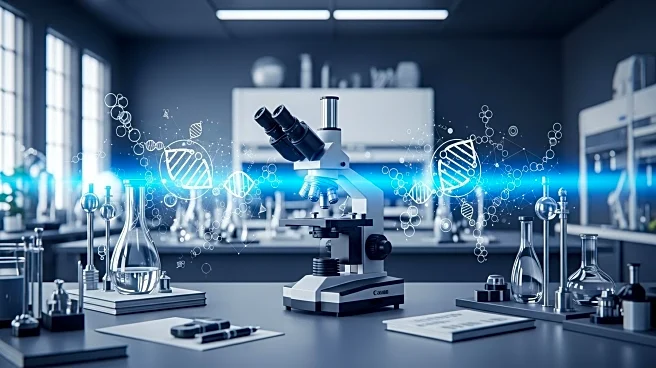What's Happening?
Biogen has decided to discontinue its work on adeno-associated virus (AAV)-based gene therapies, leading to a restructuring within the company. Approximately 20 employees have been affected by this decision, with most being reassigned to other roles within Biogen. The company, which had over 7,600 employees worldwide at the end of 2024, has been undergoing a series of cost-cutting measures aimed at saving $1 billion by 2025. This move follows similar actions by Vertex Pharmaceuticals, which also ended its AAV capsid work earlier this year. Biogen's decision comes amid skepticism from investors regarding its commercial and pipeline prospects, as reflected in a 50% drop in share prices over the past five years.
Why It's Important?
The discontinuation of AAV-based gene therapy work by Biogen marks a significant shift in the company's strategic focus. This decision could impact the future of gene therapy development, as AAV platforms have been considered promising for delivering DNA to target cells. The restructuring is part of Biogen's broader effort to optimize capital allocation and focus on therapies with the potential for better patient outcomes. The move may influence other biotech companies' strategies regarding AAV technologies, especially in light of recent controversies surrounding safety issues with similar therapies. The industry is closely watching how Biogen's pivot will affect its financial health and innovation capabilities.
What's Next?
Biogen plans to concentrate its resources on 'pioneer modalities' and therapies that promise better patient outcomes. The company is expected to continue its cost-cutting initiatives to achieve its savings goal by 2025. Stakeholders, including investors and industry analysts, will likely monitor Biogen's progress in refocusing its research efforts and the impact on its financial performance. The broader biotech industry may also reassess the viability and safety of AAV-based therapies, potentially leading to shifts in research priorities and investment strategies.
Beyond the Headlines
The decision to end AAV work raises questions about the future of gene therapy platforms and their safety profiles. Ethical considerations regarding patient safety and the efficacy of gene therapies are likely to be discussed within the scientific community. The restructuring may also have cultural implications within Biogen, as employees adapt to new roles and the company's evolving strategic direction. Long-term, this could influence the development of innovative therapies and the competitive landscape in the biotech sector.









